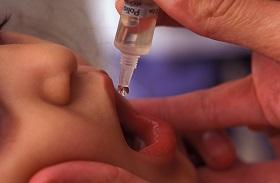Using AI to control energy for indoor agriculture
30 September 2024
Published online 1 November 2013

A polio outbreak in Syria threatens to spill into neighboring countries as millions of refugees flee the war-ravaged country. While Syria's previously robust immunization program has been disrupted by the conflict, as many as 22 cases of the virus have been detected in the country's eastern Deir-ez-Zor province.
In the ten confirmed instances of the virus, found in mid-October mostly among children under two years old, the infants are believed never to have been vaccinated or to have received only one of the four doses essential for full protection, according to the World Health Organization (WHO).
Polio, which is highly contagious and transmitted via contaminated food and water, can cause paralysis and even death, but had been almost eradicated worldwide. It is now only endemic in Afghanistan, Nigeria and Pakistan.
Before war in Syria broke out in 2011, the country had been polio-free for 14 years. WHO data prior to 2010 showed that 91% of children had received four doses of vaccine.
The UN estimates that half a million children have not been immunised, leading to fears of an outbreak across the region. Plans are in place for an emergency response in seven neighboring countries to try to halt the spread of infection: Egypt, Iraq, Israel, Jordan, Lebanon, Palestinian territories and Turkey.Results on the other 12 suspected cases are expected within days, but "no-one is waiting for final lab confirmation," says Oliver Rosenbauer, a spokesman for the WHO.
Mass movement of Syrian refugees into surrounding countries represents a grave risk of a regional resurgence, says Zaher Sahloul, president of the Syrian-American Medical Association.
I think it will be extremely hard to control now.
A recently published Médecins Sans Frontières survey, conducted in 2012, found that only 32.6% of Syrian refugee children have been vaccinated against some of the most common diseases, including polio.
"Polio is very infectious and if we [put together] crowding, poor hygiene, displacement and lack of vaccination, we have the perfect formula for spreading the epidemic out of control," says Sahloul.
Last week, the UN began a renewed effort, vaccinating 2.4 million children in Syria against polio and other diseases. Governments in neighboring countries are also escalating immunization efforts.
According to the WHO, the regional campaigns, covering 20 million children, should begin in the next week and last six to eight months. UNICEF also published a statement that "multiple, supplemental immunization campaigns against polio and other vaccine-preventable diseases will take place in Syria, and other countries across the region through the end of the year."
The UK-based charity Save the Children has urged the Syrian government and rebels to respect 'vaccination ceasefires' and allow a lull in fighting for vaccination efforts to take place.
But Sahloul is skeptical about the potential effectiveness of vaccination efforts under current circumstances. "The only hope of controlling it is if the UN and international NGOs are allowed unfettered access to all areas in Syria. This will not happen as long as the conflict continues," he says.
Annie Sparrow, a critical-care paediatrician at the Icahn School of Medicine at Mount Sinai in New York, who recently launched a study of the long-term impact of the Syrian war on civilian health, shares Sahloul's fears. "Given that most kids who get it are asymptomatic or get mild symptoms only, I think it will be extremely hard to control now," she says.
Sparrow also urges immunization against measles, tetanus, rubella, hepatitis, pertussis, BCG, diphtheria, meningitis, and chickenpox.
The UN's Rosenbauer is more optimistic. "Polio is an epidemic-prone disease and [stopping it] will be challenging, but experience in other areas with complex emergencies show that it can be done"
Across the border in Lebanon, where the immunization campaign begins next week, Roberta Russo, a spokeswoman for UN's Refugee Agency there, confirms officials from UNICEF, WHO, UNHCR and UNRWA are working with the Lebanese Ministry of Public Health to ensure Lebanese, as well as Syrian, Palestinian and Iraqi refugees are vaccinated. UNICEF will procure the vaccines, and will support the ministry as it vaccinates all Syrian children entering Lebanon through the official border crossing.
doi:10.1038/nmiddleeast.2013.201
Stay connected: